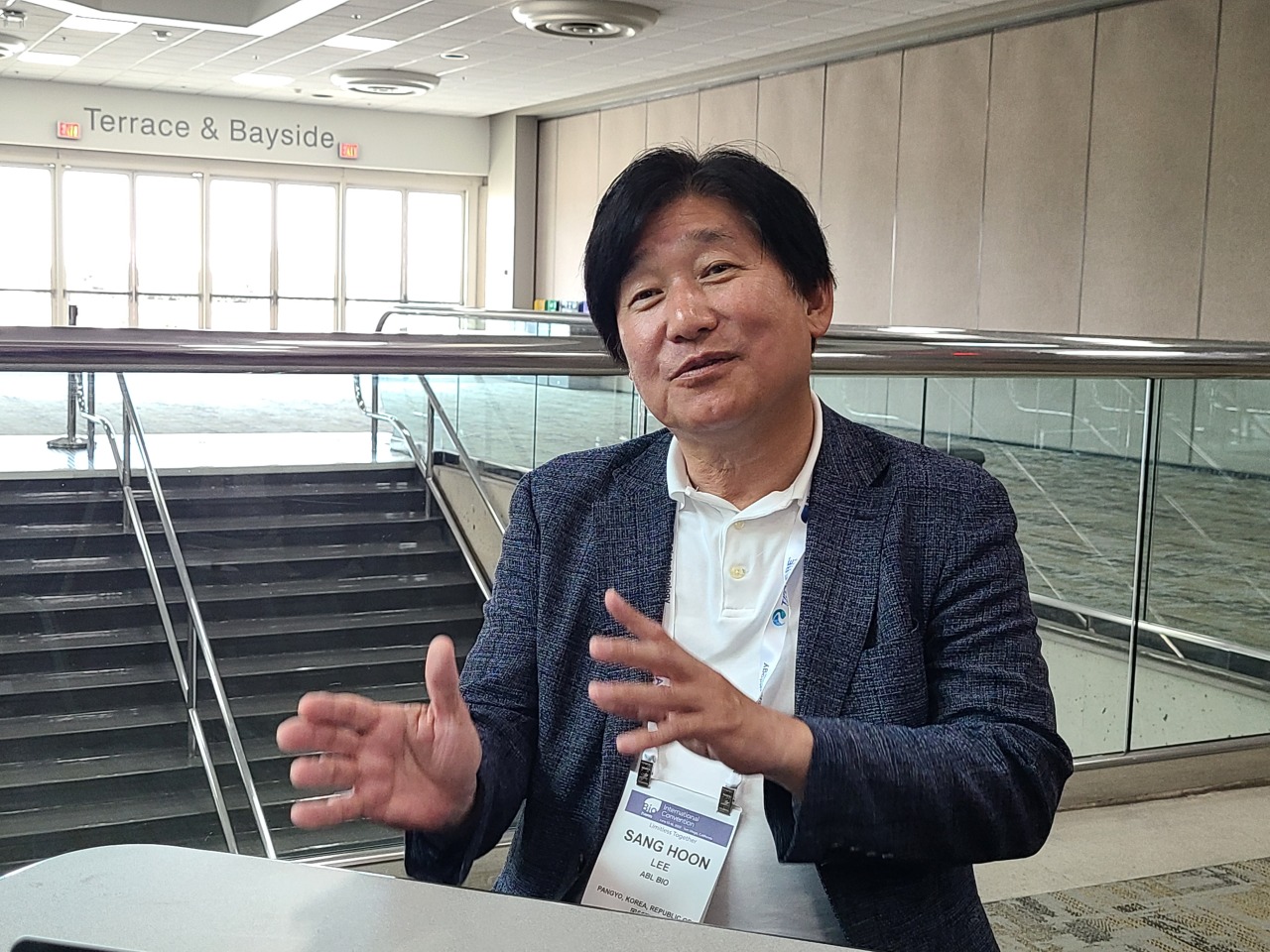[Herald Interview] ABL Bio moves up the ranks with $1b Sanofi deal
Korean biotech looking to score another major deal by selling technology license
By Kan Hyeong-wooPublished : June 19, 2022 - 15:23

SAN DIEGO -- Over 250 Korean companies participated in this year’s BIO International Convention, the world’s largest biotechnology industry gathering that took place in person for the first time in three years.
Except in the cases of big companies such as Celltrion and Samsung Biologics, most of the small biotech companies were scrapping to present their pipelines and technologies to the global market in hopes that investors and global big pharmaceutical companies will take notice.
ABL Bio used to be one of them three years ago, according to CEO Lee Sang-hoon. But it all changed after the company signed a $1.06 billion contract (1.37 trillion won) with major French pharma company Sanofi in January.
“Since the Sanofi deal, our status has changed. Our position is different. We were in a hurry before. We were in a rush to make a deal,” Lee told reporters at the convention in San Diego on Tuesday.
“But this time around, we are meeting with bigger companies and we have a higher goal now. Everyone here knows about the Sanofi deal, and our technologies are being looked at more closely, so we are in a better position.”
The megadeal included an agreement to co-develop ABL301, an antibody treatment candidate for degenerative brain diseases including Parkinson’s disease. The contract provided ABL Bio with $75 million in down payments, and the Korean biotech could receive up to $985 million depending on the success of clinical trials, regulatory approval and commercialization.
Lee said the company is looking to sell the license of its Grabody-B technology, a shuttle platform that can maximize the penetration rate of treatment substances into blood-brain barrier.
“For Grabody-B, we are reviewing technological cooperation or licensing out with companies that have antibodies for neural diseases, including dementia,” Lee said. He added that ABL Bio is currently in talks with different firms, among them global big pharma companies that have started engaging in talks with ABL Bio since the JPMorgan Health Care Conference in January.
The CEO explained that no companies are trying to examine ABL Bio’s platform technology, as Sanofi already confirmed its capabilities with the ABL301 contract which uses Grabody-B to carry the antibody.
“There could be requests for verification to check out the results of additional clinical trials by using different animal models, if companies target diseases other than Parkinson’s such as dementia. For such demands, we can verify them in a few months,” he said.
Regarding the company’s oncology treatment candidates, Lee said the company is waiting to see phase 1 clinical trial results, as they are the most important factors in the field of oncology. Deals can get a lot bigger after successful results of phase 1 clinical trials, Lee said.
“As the CEO of ABL Bio, I hope to announce some more good news in the second half of this year,” he said.
Except in the cases of big companies such as Celltrion and Samsung Biologics, most of the small biotech companies were scrapping to present their pipelines and technologies to the global market in hopes that investors and global big pharmaceutical companies will take notice.
ABL Bio used to be one of them three years ago, according to CEO Lee Sang-hoon. But it all changed after the company signed a $1.06 billion contract (1.37 trillion won) with major French pharma company Sanofi in January.
“Since the Sanofi deal, our status has changed. Our position is different. We were in a hurry before. We were in a rush to make a deal,” Lee told reporters at the convention in San Diego on Tuesday.
“But this time around, we are meeting with bigger companies and we have a higher goal now. Everyone here knows about the Sanofi deal, and our technologies are being looked at more closely, so we are in a better position.”
The megadeal included an agreement to co-develop ABL301, an antibody treatment candidate for degenerative brain diseases including Parkinson’s disease. The contract provided ABL Bio with $75 million in down payments, and the Korean biotech could receive up to $985 million depending on the success of clinical trials, regulatory approval and commercialization.
Lee said the company is looking to sell the license of its Grabody-B technology, a shuttle platform that can maximize the penetration rate of treatment substances into blood-brain barrier.
“For Grabody-B, we are reviewing technological cooperation or licensing out with companies that have antibodies for neural diseases, including dementia,” Lee said. He added that ABL Bio is currently in talks with different firms, among them global big pharma companies that have started engaging in talks with ABL Bio since the JPMorgan Health Care Conference in January.
The CEO explained that no companies are trying to examine ABL Bio’s platform technology, as Sanofi already confirmed its capabilities with the ABL301 contract which uses Grabody-B to carry the antibody.
“There could be requests for verification to check out the results of additional clinical trials by using different animal models, if companies target diseases other than Parkinson’s such as dementia. For such demands, we can verify them in a few months,” he said.
Regarding the company’s oncology treatment candidates, Lee said the company is waiting to see phase 1 clinical trial results, as they are the most important factors in the field of oncology. Deals can get a lot bigger after successful results of phase 1 clinical trials, Lee said.
“As the CEO of ABL Bio, I hope to announce some more good news in the second half of this year,” he said.







![[KH Explains] How should Korea adjust its trade defenses against Chinese EVs?](http://res.heraldm.com/phpwas/restmb_idxmake.php?idx=644&simg=/content/image/2024/04/15/20240415050562_0.jpg&u=20240415144419)











![[Today’s K-pop] Stray Kids to return soon: report](http://res.heraldm.com/phpwas/restmb_idxmake.php?idx=642&simg=/content/image/2024/04/16/20240416050713_0.jpg&u=)